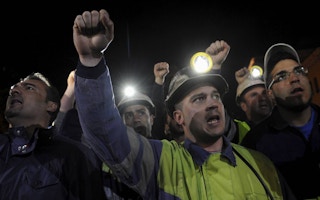Renting a pair of jeans, working on an abandoned houseboat renovated as an office, or living in a portable home made from a shipping container—these are just a few ways residents of the Dutch capital Amsterdam can play their part to save the planet.
Three years ago, the city launched a quest to become a “circular economy”—reusing products and materials, and minimising waste—by 2050.
It now has 73 related projects underway, according to Eveline Jonkhoff, a strategic advisor on the initiative.
The circular-economy push is part of a wider effort by Amsterdam to help meet the goals of the 2015 Paris Agreement to curb climate change, she told a conference on smart cities in Barcelona this week.
Other climate targets for Amsterdam focus on ending the use of natural gas by mid-century and putting in place a clean public transport system that does not contribute to planet-warming emissions by 2025.
But key to the success of the city’s push toward carbon neutrality is enabling everyone to participate, Jonkhoff emphasised.
“All these changes require very high investments, and we need to make sure this transition is affordable for everyone,” she said.
Financial instruments will be needed to help residents buy solar panels and electric cars so they are “not just for the happy few”, she added.
How to make often high-tech measures to limit global warming available and appealing to much of the public—including the elderly and the poor, who are often left out despite being most vulnerable to climate stresses—has been a key focus of the Barcelona conference this week.
In Oslo, city authorities are introducing a new congestion charge in rush hours and adding more than 50 new road toll stations in a bid to deter polluting traffic.
But “many people experience this as a challenge if they don’t have the money to pay,” noted Daniel Rees, political advisor to the Norwegian capital’s deputy mayor.
“
Countries and cities have to start designing climate policies that minimise the economic and social disruptive impacts and really maximise the benefits.
Teresa Ribera, minister for ecological transition, Spain
Shifting to cleaner modes of getting around will require sufficient public transport, safe bicycle lanes and a network of charging points for electric vehicles, he said.
And if cities start using autonomous buses in the future, alternative jobs will need to be found for drivers, he added.
Just transition
Barcelona Mayor Ada Colau, meanwhile, highlighted “climate justice” as one of four pillars of the Catalan city’s climate plan, adopted earlier this year.
The city aims to boost support for the tenth of residents who struggle to pay for energy, and to improve housing to save on energy costs and reduce health risks from extreme weather.
Barcelona—which faces more intense heatwaves, rain storms and droughts—is also doubling its bicycle lanes, adding 1.6 square metres of greenery per person by planting trees and creating public gardens, and pedestrianising some city blocks, among other measures.
Teresa Ribera, Spain’s minister for ecological transition, told the conference urban policies on climate change can improve citizens’ lives in the form of cleaner air, better-insulated buildings, energy savings and more parks.
“Greener and healthier cities are also safer cities, and more attractive places to live,” she said.
But Spain’s Socialist-led government, which came into power in June, is also aware that not everyone will win if it steps up action to decarbonise its economy, as it is promising.
Last month, in a push to close most of Spain’s coal mines by the end of this year, Madrid made a deal with unions to invest 250 million euros ($283 million) over the next five years in affected provinces, mainly in the northwest.
The money will support environmental restoration, early retirement, and training for miners to take up green energy jobs.
It would be spent under a proposed system of “just transition contracts” between the central government and local authorities that would bring in businesses, universities and others.
In Barcelona, Ribera told journalists that modern society must “pay attention to those groups who feel menaced by the transformation” to a low-carbon economy, and should offer solidarity.
“We need to help those regions see a positive, constructive future,” she said on the sidelines of the conference.
In December, the European Union launched a platform to support 41 regions in 12 countries that employ 185,000 people in coal mining to shift the focus of their economies away from producing the dirty fuel and towards clean energy.
“The just transition concerns us all,” said Elena Visnar Malinovska, head of adaptation in the European Commission’s climate action division.
“Countries and cities have to start designing (climate) policies that minimise the economic and social disruptive impacts… and really maximise the benefits,” she said.
($1 = 0.8837 euros)
This story was published with permission from Thomson Reuters Foundation, the charitable arm of Thomson Reuters, that covers humanitarian news, climate change, resilience, women’s rights, trafficking and property rights. Visit http://news.trust.org/climate.

















